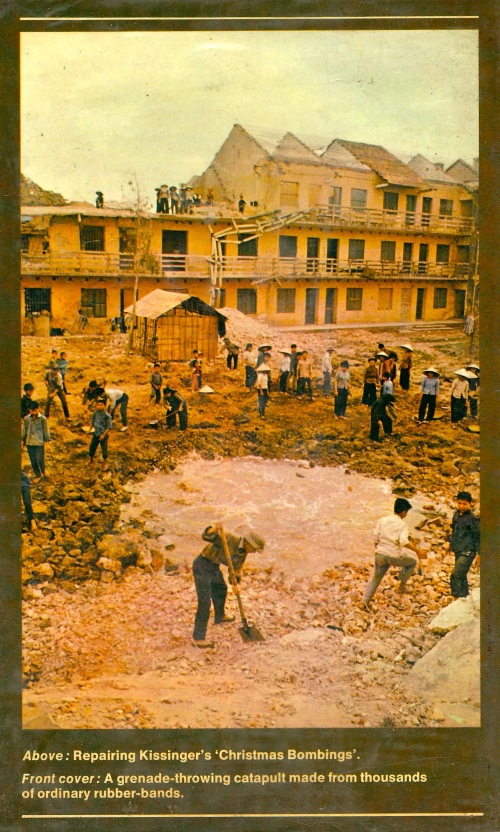Wilfred Burchett, Catapult to Freedom
Nothing is more Precious than Independence and Freedom.
Ho Chi Minh, 118
Ho: We will build our country ten times more beautiful.
Ho Chi Minh, 199
Once again, Australian journalist Wilfred Burchett counters the U.S. propaganda about the totalitarian Commie beasts. In this work, he is animated by one question: Who are these people who have dared to stand up to the mightiest powers of their day for the past 2000 years, always cocksure that they would come off as the winners? After countless hours of living and being with the Vietnamese, he can summarize their answer to his question thusly, ‘Ah, to understand that, you would have to go deeply into our history, our literature, our poetry, discover our soul and that is impossible for an outsider.’ But he gives it a great effort, covering the centrality of poetry, the links between military strategy and tactics, and the relentless commitment to independence over millennia…
Some revealing passages:
The fact that the roots of the Vietnamese people have been sunk into the same national soil since the dawn of mankind could help explain the stubbornness with which they defend that soil. 8
Nguyen Dinh Thi: Our people can stand anything that comes from nature: flood, drought, heavenly injustice that wipes out their crops. What they cannot stand is human injustice. Raise the banner against man’s injustice to man, and, as our history shows, you can quickly raise an army. 21
Audacity has always been a key and successful weapon in the VN armoury. 34
Van Tien Dung: We soaked in all this information to an extent that in every waking and sleeping moment, I was literally haunted by the topography of Saigon. Bit by bit the location of roads and canals, bridges, storage depots, administrative and military centers became engraved in my mind….These were the key centers of civil and military power, the essential cogs of the military and repressive machinery; the places where the elite of national treason were continuing to work on plans for continuing the war. 58
In the same way they took what was logical, humanist, and realistically ethical in the Confucian doctrines. On this latter point one can find common ground in the ethical qualities which Confucius wanted in his Superior Man and those that today’s Vietnamese Communists want cultivated in what they call their New Man. 69
The recurring dramas of the battles for national survival, the beauties of the country’s forests, mountains, rivers and coasts—to say nothing of the people themselves, the six-tone musicality of the language, plus the thorough grounding in literary appreciation which formed the backbone of the educational system, have all combined to stimulate the cult of the poet. 69
Rice, fish and salt provided the means for living from century to century and this was, indeed, the economic basis for waging incessant wars of national survival. 74
HCM: His impact was so great that it is no exaggeration to state that the secret of the globe-shaking events in Vietnam during March/April 1975, was that he managed to inject something of himself into every contemporary Vietnamese. 93
HCM, Testament: About personal matters—all my life I have served the Fatherland, the revolution and the people with all my heart and strength. If I should now depart from this world, I would have nothing to regret, except not being able to serve longer and more. 106
From a footnote: Anyone who thinks that Vietnam’s history started with the Bolshevik or Chinese Communist revolutions only has to stroll around the boulevards and streets of Hanoi, the finest of them named after their own—and not others’—revolutionary heroes. Not only those of the battlefield but, as Ho Xuan Huong Street demonstrates, heroes and heroines of their literature and poetry. It is in this spirit that one must understand the renaming of Saigon as Ho Chi Minh City. 132
Someone, indeed thousands of ‘someones’ must have spotted them moving into position, but the word never reached the Buon Me Thuot command or Saigon. That this was possible exploded the myth that because Saigon controlled the principal capitals it also controlled the surrounding countryside. The disintegration of Saigon prestige—partly because of its insistence on continuing the war, partly because it relied exclusively on repression to exert control—was such that even its local officials heaved a sigh of relief at the regime’s impending destruction. 148
–Wednesday 18 May 2011
